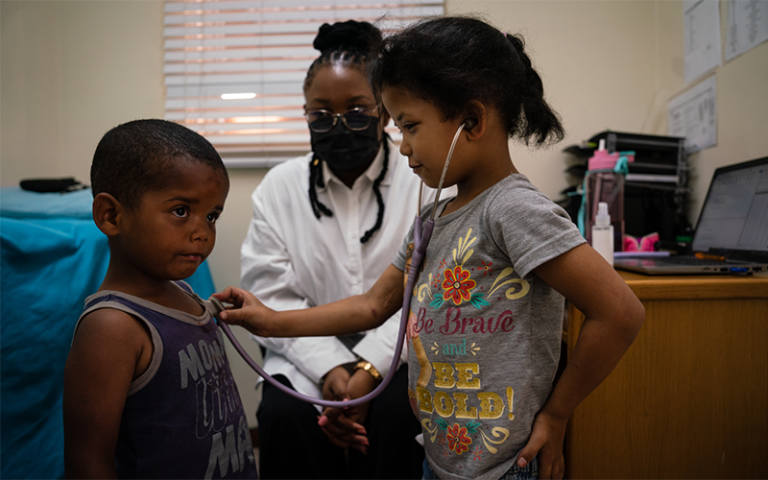First effective treatment to prevent multidrug-resistant TB
16 November 2023
An oral antibiotic taken once daily for six months can substantially reduce the risk of developing multidrug-resistant (MDR) tuberculosis (TB) in both children and adults, according to two landmark clinical trials involving UCL researchers.

The results were announced at the Union World Conference on Lung Health in Paris.
One trial, known as TB-CHAMP, took place in South Africa, at five research sites in six provinces serving communities with high burdens of TB and MDR-TB. It was led by Stellenbosch University, and the MRC Clinical Trials Unit (CTU) at UCL were responsible for the trial management and statistical analysis.
The study included 922 children and adolescents exposed to an adult with MDR-TB in their household, and found that levofloxacin reduced the risk of MDR-TB disease by 56%. After one year, five children (1.1%) who were given levofloxacin had developed TB, compared to 12 (2.6%) who were given a placebo.
The study also found that levofloxacin was safe for children, with very few side effects reported. Joint pain and tendonitis, traditionally a concern with levofloxacin use, were very uncommon among participants.
Another study, the VQUIN trial, led by the Woolcock Institute of Medical Research and The University of Sydney, was conducted across 10 provinces in Vietnam, and mainly focused on adults. The study included 2,041 adults and children living with a person with MDR-TB in the household and found that levofloxacin reduced the risk of MDR-TB by 45%.
The data from both trials were combined in further analyses led by UCL researchers, confirming that levofloxacin was similarly effective in preventing TB in adults and children, and was safe. These results were also presented at the Union conference.
Every year, around 500,000 people develop TB that is resistant to multiple antibiotics. MDR-TB is complex to treat and difficult to cure, with high costs to both families and health services. TB remains a leading cause of death among children, particularly those under five years old. Only 10-15% of children with MDR-TB are diagnosed and treated, making them one of the most neglected populations affected by TB globally. Many of these children have been in close contact with another infectious MDR-TB patient. Therefore, identifying these children, screening them for TB and offering preventive treatment will be critical to preventing MDR-TB in children.
While there have been many advancements around preventing drug-susceptible TB, there is limited evidence around preventative treatment for MDR-TB, as no randomised trials had previously been conducted. The results from the TB-CHAMP and V-QUIN trials provide evidence that levofloxacin can prevent people with early infection from developing MDR-TB. This will help protect against the social and financial consequences of drug-resistant TB, as well as the risk to physical health.
The TB-CHAMP and VQUIN teams collaborated early on the planning of the combined analyses, before the results for either trial were known. On their own, each individual trial did not have enough statistical power to confidently answer the research question, as there were fewer TB cases in the control groups than expected. But pooling the data meant that researchers could provide robust evidence about the effectiveness of levofloxacin.
Researchers carried out analyses using standard methods as well as a novel Bayesian approach developed by Becky Turner and Professor Ian White (both MRC CTU at UCL). They showed that across both trials, levofloxacin reduced the risk of developing MDR-TB by 60%. The analysis also showed similar results for each trial individually.
Trinh Duong (MRC CTU at UCL), TB-CHAMP trial statistician and lead for the combined analysis, said: “This novel Bayesian analysis, combining data from two trial populations using novel methodology developed at UCL, may pave the way for combining future paediatric and adult trial data, ensuring that children are not left behind. By carefully planning this work in advance, we have been able to present these important findings alongside the main results of the two trials, with greater potential impact on global guidelines and policy.”
In December 2023, an advisory committee of the World Health Organization will consider new guidelines for MDR-TB preventative treatment. The data from the TB-CHAMP and the VQUIN trials are being shared to inform how these deliberations produce new recommendations for children and adolescents. The TB-CHAMP and VQUIN trials both included work on other important considerations such as acceptability, feasibility, health economics, pharmacokinetics and antimicrobial resistance.
TB-CHAMP was funded by UNITAID, under the BENEFIT Kids project at Stellenbosch University. The trial was also funded by the South African Medical Research Council and the UKRI Medical Research Council, with support from the Department of Health and Social Care, the Foreign, Commonwealth & Development Office, the Global Challenges Research Fund, the Medical Research Council and Wellcome, as part of the EDCTP2 programme supported by the European Union. The VQUIN trial was funded by the Australian National Health and Medical Research Council.
Links
- The Union World Conference on Lung Health 2023
- Trinh Duong’s academic profile
- MRC Clinical Trials Unit at UCL
- UCL Population Health Sciences
- TB-CHAMP trial webpage
- VQUIN trial webpage (Woolcock)
Image
- Credit: Damien Schumann. Courtesy of Stellenbosch University
Media contact
Mark Greaves
E: m.greaves [at] ucl.ac.uk
 Close
Close

